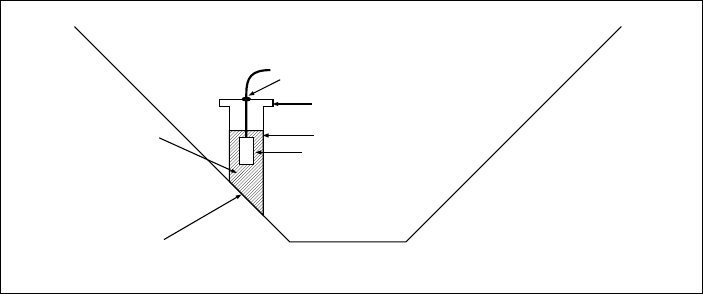
DS41 Owner’s Manual13
RUBBER GROMMET
SEAL CAP
OIL
DEADRISE
ANGLE CUT
PVC PIPE
TRANSDUCER
Figure 7. In-Hull Installation
In-Hull Installation
Transducer installation inside a solid fiberglass
hull may degrade performance of depth sounder.
Therefore, this type of installation is not preferred
over thru-hull and transom installations.
Should the user desire to perform an in-hull
installation, perform the following test to
determine its suitability.
1. Fill a thin plastic bag with water and
suspend the transducer in the water.
2. Hold the bag against the hull while the boat
is moored and underway and check the
reading on the instrument. The reading
should be relatively constant.
3. The bag may have to be moved around the
hull to find the best mounting location. the
best location will be close to the centerline ,
away from any lifting strakes.
To Install:
After determining that the transducer will function
inside the hull, construct a water box to be used
for installation.
4. Use a PVC pipe with one end threaded and
supplied with a screw on cap. The PVC
pipe should be 1/4 inch bigger than the
bottom face of the transducer.
5. Install the transducer as shown in Figure 7.
6. To receive a proper echo from the bottom,
the bottom of the PVC pipe may have to be
cut at the deadrise angle of the hull.
Transom Installation
On transom installation, mount your transducer
as close to the centerline (keel) of the boat as
possible. On slower, heavier displacement
boats, positioning the transducer farther from
the keel is acceptable.
On two-drive installations, install the transducer
between drives.
On single drive installations, mount the
transducer on the side of the boat where the
propeller blade is rotating down to minimize
cavitation. If feasible, mount the transducer at
least 2 inches (50 mm) beyond the swing radius
of the propeller. See figure 6.
Note:
Do not mount transducer directly behind
any strakes, ribs, intakes or outlets for live
wells and engine cooling water, and any
protrusion that may cause turbulence or
cavitation.


















